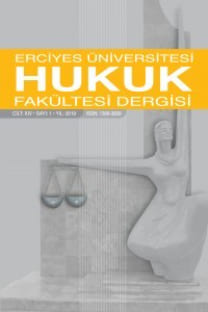Sözleşme ekonomisinin bozulmasıyla ilgili kuramların Türk hukuku’ndaki uygulamaları ve yeni Türk borçlar kanunu’nda aşırı ifa güçlüğü
Özellikle uzun süreli sözleşmelerde sözleşme yapıldıktan sonra meydana gelen olaylar, sözleşmenin öngördüğü edimler dengesini bozabilir, Toplumun tamamını etkileyen, savaş, doğal afet veya ekonomik kriz gibi olayların meydana gelmesiyle çok sayıda sözleşmenin edimler dengesinin bir anda bozulması mümkündür. Yakın tarihinde pek çok ekonomik kriz ve devalüasyon yaşamış olan ülkemizde de sözleşmenin dengesinin bozulmasıyla ilgili kuramlara sıklıkla ihtiyaç duyulmuştur. Her ne kadar Borçlar Kanunumuzda bu konuyla ilgili genel bir düzenleme yoksa da mahkeme kararlarında mukayeseli hukuktaki kuramların bu boşluğu doldurmak amacıyla kullanıldığını görmekteyiz. Bu amaçla kullanılan kuramlardan özellikle "işlem temelinin çökmesi" ve "uyarlama" kuramlarıyla ve istisna sözleşmelerine özgü bir düzenleme olan BK 365/11 maddesinin uygulamasıyla ilgili Türk Mahkemeleri'nde oluşan içtihat, ülkemizin ekonomik koşulları neticesinde olağanüstü gelişmiştir. Bu çalışmada bu kuramların uygulaması incelenecek ve Türk orçlar Kanunu Tasarısı'nın konuyla ilgili düzenlemesi bu içtihatlar ışığında değerlendirilecektir.
Applications of theories regarding supervening disequilibrium in contractual obligations in Turkish law and excessive hardship in the new code of obligations
Events subsequent to the conclusion of the contract may alter the equilibrium of contractual obligations, especially in long-term contracts. Equilibrium of many contracts may be suddenly disturbed by an event that affects the whole society such as war, natural disasters or economic crisis. In our country that experienced economic crisis and devaluations in its recent past, the need for theories regarding supervening disequilibrium is often felt. Although the Code of Obligations (C.O.) does not include a general provision regarding this issue, we may observe that in court decisions different theories in comparative law are used to fill this gap. As regards these theories, “collapse of the foundation of transaction”, “adaptation” and the application of art. 365/II of the C.O. in particular, Turkish Courts have a wellestablished case-law that was developed because of economic conditions of this country. In this paper, the applications of these theories will be studied and the provisions of the Draft Code of Obligations regarding this issue will be examined in the light of the case-law.
___
- ISSN: 1306-3839
- Yayın Aralığı: Yılda 2 Sayı
- Başlangıç: 2006
- Yayıncı: ERCİYES ÜNİVERSİTESİ HUKUK FAKÜLTESİ
